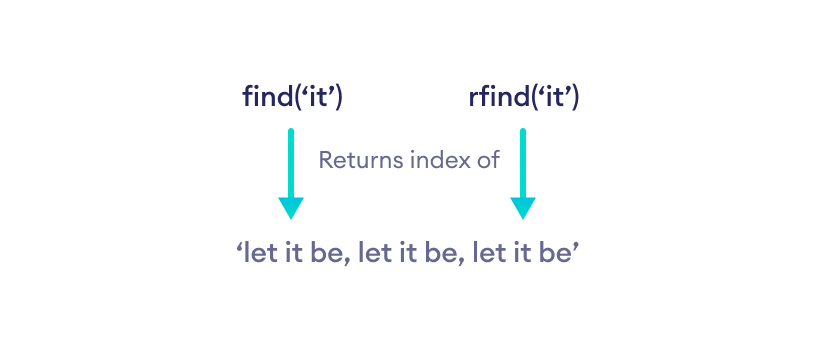The find() method returns the index of first occurrence of the substring (if found). If not found, it returns -1.
Example
message = 'Python is a fun programming language'
# check the index of 'fun'
print(message.find('fun'))
# Output: 12
find() Syntax
The syntax of the find() method is:
str.find(sub[, start[, end]] )
find() Parameters
The find() method takes maximum of three parameters:
- sub - It is the substring to be searched in the str string.
- start and end (optional) - The range
str[start:end]within which substring is searched.
find() Return Value
The find() method returns an integer value:
- If the substring exists inside the string, it returns the index of the first occurence of the substring.
- If a substring doesn't exist inside the string, it returns -1.
Working of find() method

Example 1: find() With No start and end Argument
quote = 'Let it be, let it be, let it be'
# first occurance of 'let it'(case sensitive)
result = quote.find('let it')
print("Substring 'let it':", result)
# find returns -1 if substring not found
result = quote.find('small')
print("Substring 'small ':", result)
# How to use find()
if (quote.find('be,') != -1):
print("Contains substring 'be,'")
else:
print("Doesn't contain substring")
Output
Substring 'let it': 11 Substring 'small ': -1 Contains substring 'be,'
Example 2: find() With start and end Arguments
quote = 'Do small things with great love'
# Substring is searched in 'hings with great love'
print(quote.find('small things', 10))
# Substring is searched in ' small things with great love'
print(quote.find('small things', 2))
# Substring is searched in 'hings with great lov'
print(quote.find('o small ', 10, -1))
# Substring is searched in 'll things with'
print(quote.find('things ', 6, 20))
Output
-1 3 -1 9
Also Read:
